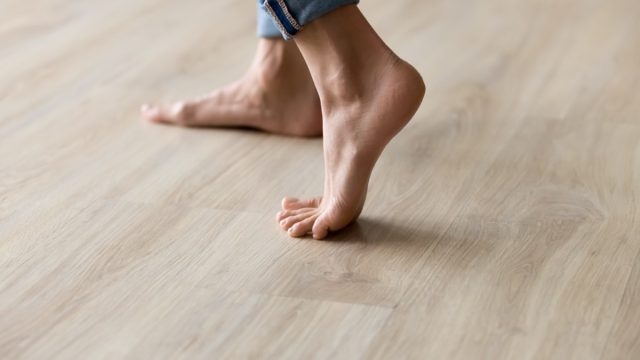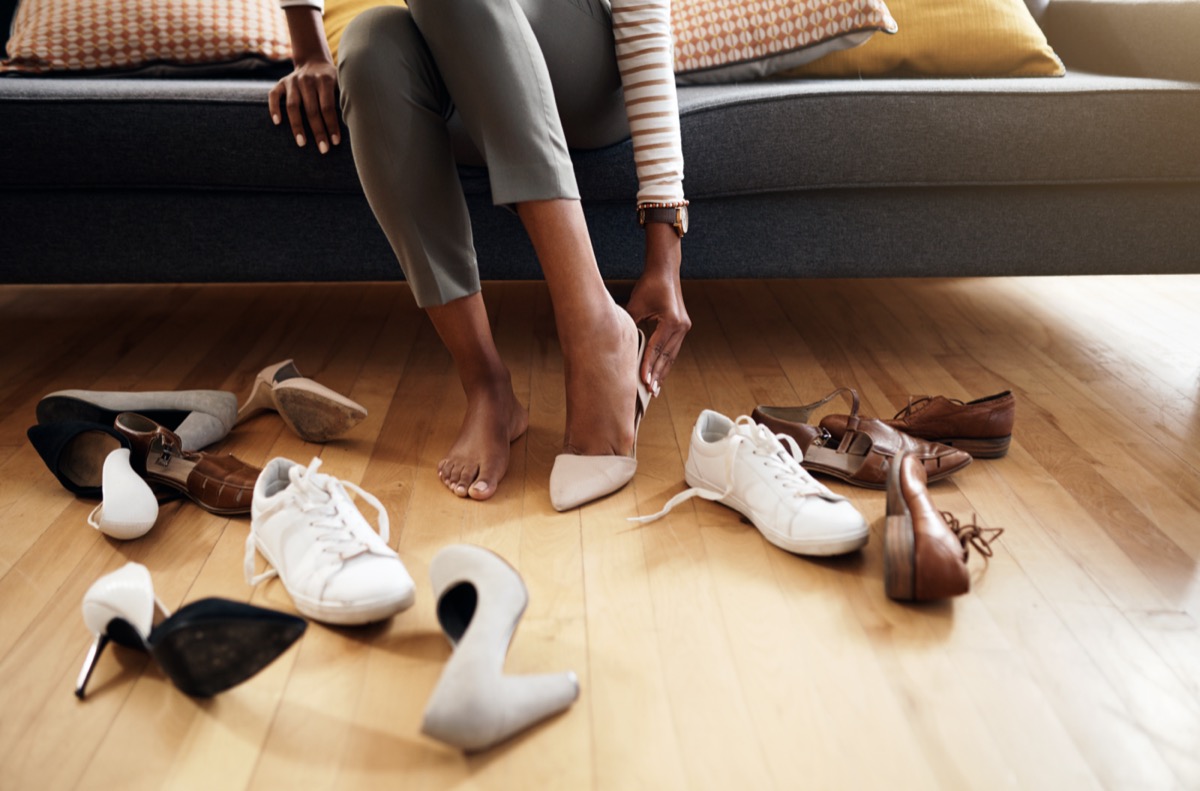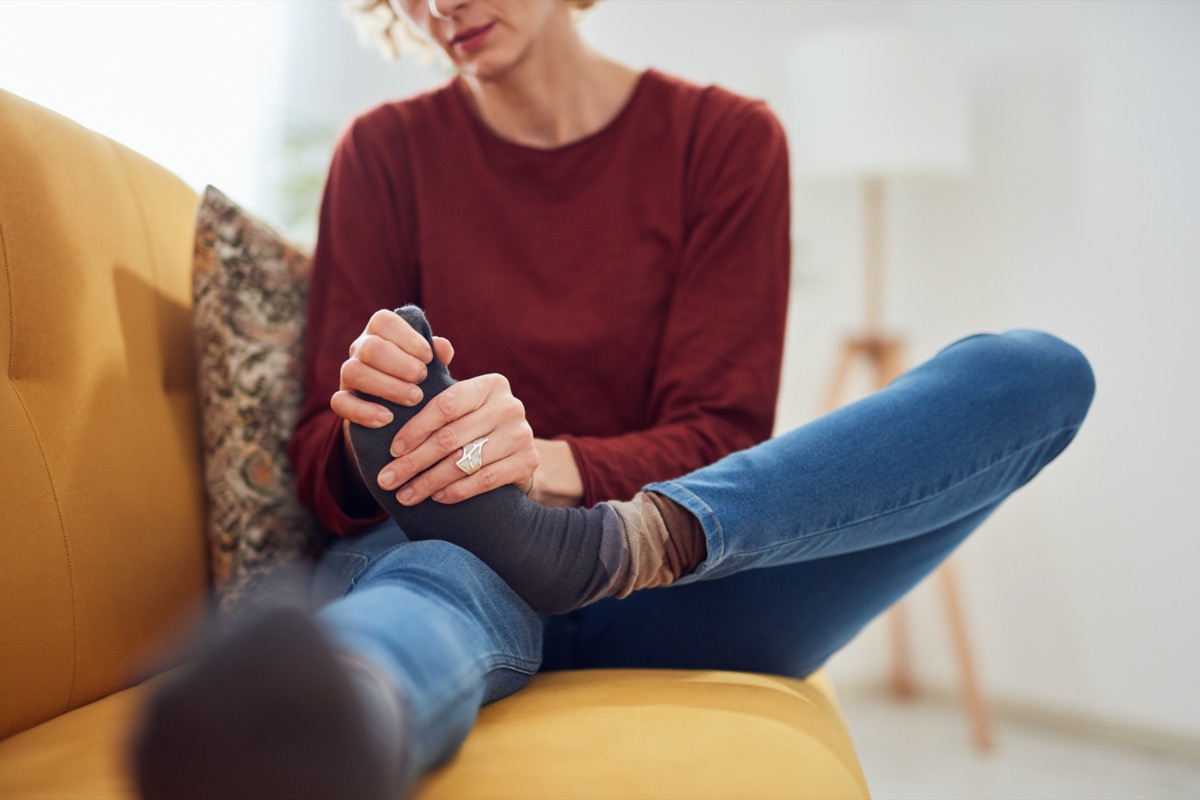5 Things Your Feet Wish You’d Stop Doing, According to Experts

Maintaining your mobility is one of the best ways to retain your independence and quality of life as you age, experts say. Yet according to a 2022 study in the journal Foot and Ankle Orthopedics, over 96,000 Americans suffer from foot and ankle injuries every year that are bad enough to result in missed workdays.
The good news? Many of the problems which commonly affect the feet are either avoidable or treatable if you know what to look for, experts say.
Read on to learn which five things your feet with you’d stop doing, according to best-in-class orthopedic specialists and physical therapists.
READ THIS NEXT: Love Walking Around Barefoot Indoors? This Podiatrist Says You Should Stop Now.
1
Rushing into a new sport or exercise program

Exercising regularly is one of the best things you can do for your health, but Kenneth Jung, MD, an orthopedic surgeon specializing in foot and ankle surgery at Cedars-Sinai Kerlan-Jobe Institute in Los Angeles, California, cautions against rushing into a new sport or exercise program. He says that’s because injuries are “notoriously reported to occur in ‘weekend warriors,'” or people who join sports on an occasional basis.
“If you are picking up a new activity or sport, it is essential to remember to do so gradually—especially for those ‘explosive’ and ‘reactionary’ sports like basketball, soccer, tennis, and racquetball,” he explains. Jung adds that stretching and maintaining flexibility are essential to avoiding injury, especially to the Achilles tendon. “It is also vital to focus strength training activities on the feet, which can often be neglected, but the joints in your feet bear a lot of burdens, and they should be tended to accordingly,” he adds.
READ THIS NEXT: Doing This When You Walk Slashes Your Risk of Heart Attack, Cancer, and Dementia, New Study Says.
2
Wearing the wrong shoes

Besides stretching, one of the best ways to prevent foot injuries is to wear proper footwear. “Making sure you have good supportive shoes, with arch support is best. Often getting over the counter insoles that have better arch support than even your good running shoes is helpful,” says Rachel Triche, MD, an orthopedic foot and ankle surgeon at Cedars-Sinai Kerlan-Jobe Institute in Los Angeles, California.
For more health news sent directly to your inbox, sign up for our daily newsletter.
3
Ignoring injuries

Far too often, athletes try to push through their injuries. This is especially dangerous in the case of minor fractures, which most often require that the patient wear a walking boot, brace, or crutches to reduce the injury’s weight-bearing load.
“Though hairline foot fractures usually heal with minimal intervention, it is essential not to ignore them,” explains Jung. “Playing or working through an injury that hasn’t been evaluated by a trained medical provider can be a recipe for disaster and make matters worse. So please don’t risk it, and have it evaluated,” he advises.
4
Continuing to run with plantar fasciitis

Another thing your feet wish you’d stop doing is continuing to run when you have plantar fasciitis. This occurs when you overuse your feet, causing strain to the fibrous attachment between the heel and the toes.
“Ideally, taking some time off from running and even walking for exercise will help improve symptoms, along with the use of appropriate footwear, stretching exercises, arch support, and for some people, adding physical therapy,” says Jung. “For more severe cases, high impact activity really should be avoided as it will be painful and can make the symptoms worse and more prolonged,” he tells Best Life.
Fletcher Zumbusch, PT, DPT, CSCS, a physical therapist at Providence Saint John’s Health Center’s Performance Therapy in Santa Monica, California, agrees that this is one of the worst offenses you can commit against your feet. “Continuing to run with plantar fasciitis is like stoking the fire,” he says. Zumbusch notes that failing to rest can cause inflammation, which will “significantly draw out the recovery process.”
5
Googling your symptoms instead of seeing an expert

Zumbusch says another mistake you’re making when it comes to your podiatric health is trying to assess your own injuries or conditions with the help of the internet—instead of the help of a medical professional.
“Nearly all people I have seen in-clinic for plantar fasciitis have been experiencing various degrees of pain for a long time and have put off seeking professional help, instead trying to manage the condition on their own,” he tells Best Life. “By the time I see them, they have allowed their pain and inflammation to spiral out of control. Instead of what would have been a few weeks’ break from running and gradual return to activity, the condition is so bad that it may take several weeks or months to resolve.”
The next time you experience pain or discomfort in your feet, don’t wait to reach out to your doctor or physical therapist. With professional guidance, many foot afflictions can be resolved with minimal intervention.
Best Life offers the most up-to-date information from top experts, new research, and health agencies, but our content is not meant to be a substitute for professional guidance. When it comes to the medication you’re taking or any other health questions you have, always consult your healthcare provider directly.